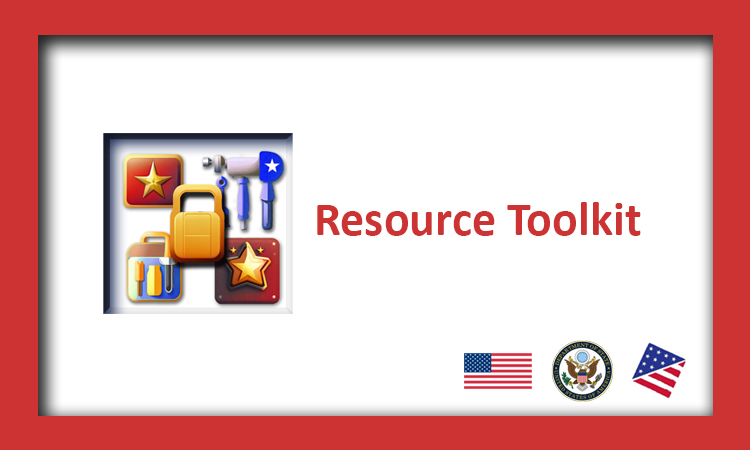INFORMATION AND DATA PRIVACY
PROGRAM TOOLKIT FOR AMERICAN SPACES
This program toolkit is designed for programming at American Spaces, aiming to define privacy, explain its importance, describe U.S. privacy frameworks, and analyze global approaches to privacy.

DEFINITIONS
- Information and Data Privacy: The protection of personal information and the right of individuals to control how their data is collected, used, and shared.
- Confidentiality: The practice of keeping sensitive information private and restricting access to only authorized individuals or entities.
- Informed Consent: The voluntary and knowledgeable agreement to allow the collection, use, or disclosure of personal information.
- Surveillance: The systematic monitoring of individuals, groups, or activities, often involving the collection and analysis of information for various purposes.
- Anonymity: The condition of remaining unidentified or untraceable in the context of personal data, ensuring individuals can engage without revealing their true identity.
- Right to be Forgotten: The concept that individuals have the right to request the removal or deletion of their personal information from databases or online platforms under certain circumstances.
WHAT IS INFORMATION AND DATA PRIVACY?
Information and Data Privacy is the right of individuals to keep their personal information and activities confidential, free from surveillance or intrusion by others. It involves controlling what information is shared and with whom, fostering a sense of autonomy and security in personal matters.
THE IMPORTANCE OF INFORMATION AND DATA PRIVACY
Information and Data Privacy is crucial for safeguarding personal autonomy, allowing individuals to retain control over their private information and make decisions regarding its disclosure. It fosters trust in relationships, both interpersonal and with institutions, by ensuring that sensitive details are handled with care and respect. Additionally, Information and Data Privacy is essential for protecting individuals from potential abuses, discrimination, and unauthorized manipulation of their personal data.
U.S. DATA PRIVACY ACTS
The Privacy Act of 1974 regulates the handling of personal information by federal agencies, granting individuals the right to access and correct their records. It ensures confidentiality and limits personal data sharing by government entities, striving to balance information needs with individual data privacy

LESSON PLANS
DLA Piper Global Data Protection Laws of the World – Provides an overview of the key information and data privacy and data protection laws and regulations across the globe. The website includes a user-friendly “compare” tool for analyzing information and data privacy laws in different countries. It covers details such as information and data privacy laws, definitions, authority figures, and enforcement mechanisms worldwide.
Privacy Curriculum Matrix K-12 – This lesson plan is designed to help individuals understand the consequences of disclosing their personal information and to highlight the importance of respecting the information and data privacy of others.
Online Safety Basics – This article provides ten essential tips for safeguarding personal data and maintaining online safety.
Module 1: You’re Leaving Footprints | Teaching Information and Data Privacy – This lesson plan describes how both online and offline activities contribute to an individual’s information “footprint.” It also explores methods for individuals to limit the exposure of their footprint.
Identity Isn’t Guaranteed – This video explores the concept of data tracking, delving into various methods and tools designed to effectively mitigate tracking and enhance user information and data privacy in the digital realm.
International Information and Data Privacy Laws: A Guide – This guide examines major global Information and Data Privacy laws and regulations, focusing on Europe, the U.S., China, Brazil, and Australia. It includes definitions and information on the core principles underlying Information and Data Privacy laws.
protection. This framework enhances government accountability and transparency in managing personal data.
The Gramm-Leach-Bliley Act (GLBA) regulates how financial institutions handle consumers’ private information. It requires banks and other financial companies to establish privacy rules and practices to protect the confidentiality and security of nonpublic personal information. The GLBA also requires institutions to provide consumers with annual data privacy notices explaining how they use and share information.
The Fair Credit Reporting Act (FCRA) regulates the collection, accuracy, and use of consumer credit information. It ensures fairness, accuracy, and privacy in the reporting of individuals’ credit histories by credit reporting agencies. The FCRA gives consumers the right to access their credit reports, dispute inaccurate information, and provide guidelines for the acceptable use of credit reports by businesses.
The Health Information Portability and Accountability Act (HIPAA) protects the privacy and security of individuals’ health information. It establishes rules and standards for how healthcare providers and health plans must safeguard and manage sensitive patient data. HIPAA aims to ensure the confidentiality of medical information and gives patients control over who can access their health records.
GLOBAL APPROACHES TO INFORMATION AND DATA PRIVACY
Global approaches to Information and Data Privacy differ significantly. In the European Union, the General Data Protection Regulation (GDPR) imposes strict rules to protect people’s data privacy. It serves as a broad protective measure, discouraging any unnecessary handling of personal data. In contrast, the United States leans towards a more flexible approach, promoting the potential for innovation and creativity in utilizing data. This approach often prioritizes business flexibility, aiming to strike a balance between encouraging technological advancements, fostering innovation, and addressing privacy concerns as they arise, rather than through upfront, restrictive measures.
In Asia, countries like Japan and South Korea have strict rules about protecting data, which often focus on specific types of businesses. This means they make special rules that fit the needs of certain industries. In Latin America, countries like Brazil and Argentina are making new laws to protect data, influenced by the GDPR in Europe. These rules address key aspects such as data collection, usage, and storage practices, aiming to ensure comprehensive Information and Data Privacy protection for everyone. Around the world, information and data privacy rules vary, with some focusing on specific industries and others having broad guidelines for everyone.
DISCUSSION QUESTIONS
- What are the Information and Data Privacy laws in your country, and can you provide examples of these laws?
- How do different countries approach protecting people’s information and data privacy?
- What steps should you take to protect your online information and data privacy?
- How do you manage your digital “footprint,” and what measures could you take to limit your online exposure?
- How would you explain the importance of information and data privacy to someone who may not be aware of the potential risks and benefits?
MORE RESOURCES
You’re Leaving Footprints – Video defining a digital “footprint” and offering methods to minimize people’s exposure.
Teacher’s Portal | Teaching Information and Data Privacy – Lesson plans covering the ten principles of information and data privacy, including topics such as anonymity, security protections, and managing information footprints.
Free Internet Safety Tutorial at GCFGlobal – Free online tutorial providing various Internet safety tips.
Five Ways to Reduce Identity Tracking Online | WSJ – Article about reducing identity tracking online.
Teaching Information and Data Privacy – Youtube – Videos providing information on threats to online information and data privacy and guiding Internet users in making informed decisions to enhance their Information and Data Privacy.
Data Privacy Overview for K12 Teachers and Administrators – Video providing an overview of information and data privacy.
Online Privacy and Security | Consumer Advice – Understanding online privacy, securing your devices against hackers and threats, and navigating common online scams.
Protecting Kids Online | Consumer Advice – How to engage in conversations about responsible online behavior and assist younger individuals in making informed decisions to ensure their safety.
Cover Your Tracks – See how online trackers view your browser.
Spread Information and Data Privacy – information and data privacy tips, crash courses, and research provided by DuckDuckGo.
Identity Theft | Consumer Advice – How to safeguard your personal information from identity theft.
Data Protection Laws and Regulations Report 2023 USA – Information about various information and data privacy laws and enforcement in the U.S.
The views expressed in these links and resources do not necessarily reflect those of the U.S. government.
Updated December 2023









